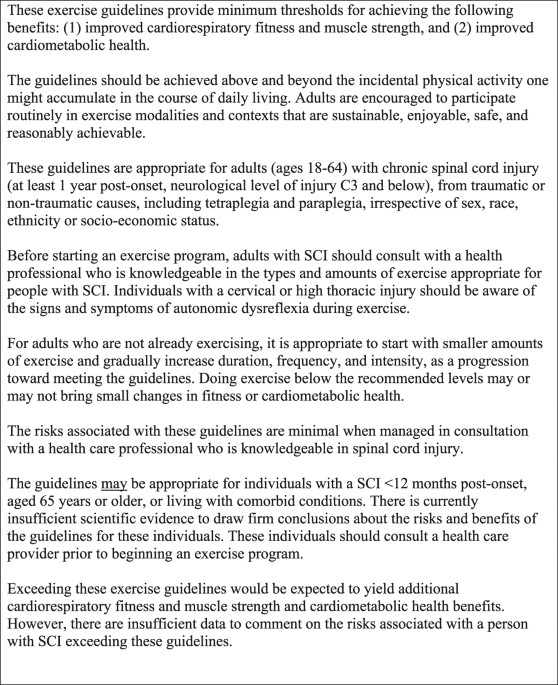Health Insurance for Spinal Cord Injury: Full Coverage Guide
Health insurance for spinal cord injury covers medical expenses and rehabilitation costs. It typically includes hospital stays, surgeries, and ongoing therapy.
Securing adequate health insurance is vital for individuals facing the life-changing event of a spinal cord injury (SCI). The financial implications of such an injury can be overwhelming, as they often require long-term, intensive care and support. Health insurance plans that cater to SCI patients provide a safety net that can help cover the daunting medical bills associated with emergency care, surgical procedures, therapeutic interventions, and necessary medical equipment.
It’s important to review and understand the specific coverage details within an insurance policy, as they can vary widely in terms of benefits, out-of-pocket costs, and facility choices. Navigating the insurance landscape with a focus on SCI can empower patients to access critical healthcare services essential for their recovery and long-term well-being.
Introduction To Spinal Cord Injury And Health Insurance
Spinal cord injuries (SCIs) can change lives in an instant. Such injuries often require long-term medical care. Health insurance plays a key role in covering costs. It helps in getting proper treatment. Let’s dive deeper into understanding spinal cord injuries and the importance of health insurance.
The Gravity Of Spinal Cord Injuries
Spinal cord injuries are serious. They can cause lasting damage. Nerves in the spinal cord affect how our bodies move and feel. When these nerves get hurt, it can lead to paralysis. The impact can be partial or complete loss of movement or sensation.
- Immediate medical care is critical after an SCI.
- Rehabilitation and equipment may be needed for recovery or adaptation.
- Lifelong changes in daily life and work are common with SCIs.
- Financial burdens from medical costs are significant without insurance.
Role Of Health Insurance In Managing Care
Health insurance for spinal cord injury is essential. It helps manage care costs. Coverage can include various needs:
| Type of Coverage | Benefits |
|---|---|
| Emergency services | Covers immediate treatments after injury |
| Surgery and hospitalization | Pays for essential medical procedures and stays |
| Rehabilitation | Assists in recovery and therapy expenses |
| Mobility aids | Includes wheelchairs and modified vehicles |
| Long-term care | Supports ongoing health and personal needs |
Choosing the right health insurance requires attention. Plans vary in coverage and costs.
- Evaluate insurance policy options carefully.
- Check what treatments and equipment are covered.
- Consider potential future health needs.
- Look for plans with extensive SCI care options.
Insurance can ease the financial strain and support a better quality of life after an SCI.
Types Of Health Insurance Plans
Choosing the right health insurance plan is crucial, especially for those managing spinal cord injuries. Understanding the available options can help secure the best care while managing costs effectively.
Employer-provided Vs. Private Insurance
Employer-provided insurance plans often come at a lower cost. They benefit from group rates. Consider them if available. Here are key details:
- Offered through your job.
- May cover a portion of your premiums.
- Often includes spinal injury care.
Private insurance plans are for those without employer options. They cater to individual needs. Look at their highlights:
- Purchased on your own from insurance companies.
- Flexible coverage for spinal care may be available.
- Potentially higher costs without group rates.
Hmos, Ppos, And Epos: What Suits Spinal Care?
Different plan structures can impact your spinal injury treatment. Find out which meets your healthcare needs:
HMOs (Health Maintenance Organizations)
HMO plans focus on preventive care. They require choosing a primary care physician (PCP). Take note:
- PCP manages your care.
- Referrals needed for specialists, including spinal care experts.
- Lower out-of-pocket costs potential.
PPOs (Preferred Provider Organizations)
PPO plans offer flexibility in healthcare providers. They suit those seeking specialized spinal care. Highlights:
- No PCP or referrals necessary.
- Wider network of doctors and hospitals.
- Higher premiums but more choice.
EPOs (Exclusive Provider Organizations)
EPO plans blend HMO and PPO features. You get a comprehensive network and don’t need referrals. Points to consider:
- Select from the EPO’s network providers.
- No coverage for out-of-network care.
- May result in lower costs than PPOs.
Evaluating Your Insurance Needs
Evaluating your insurance needs is a crucial step after a spinal cord injury (SCI).
Understanding policy details ensures your expenses have coverage.
A well-tailored insurance can mean a smoother recovery journey.
Let’s explore the essential factors for solid SCI insurance coverage.
Assessing Coverage Essentials For Spinal Injuries
Spinal cord injuries often require extensive medical treatment.
Immediate care costs are just the beginning.
- Emergency services: Coverage vital from day one.
- Surgeries: Multiple operations may be necessary.
- Hospital stays: Accounts for the bulk of initial costs.
- Medication: Ongoing prescription needs.
- Rehabilitation: Essential for recovery.
- Durable medical equipment: Includes wheelchairs and home modifications.
- Follow-up care: Regular visits to specialists.
Ensure all these points feature in your plan.
Long-term Care Considerations
Spinal injuries often require long-term support.
Future medical needs can be unpredictable.
Quality of life hinges on ample insurance protection.
| Long-term Care Needs | Coverage Check |
|---|---|
| Home care services | – Must review |
| Nursing home facility | – Should confirm |
| Physical therapy | – Repeated sessions expected |
| Occupational therapy | – Helps in skill redevelopment |
| Mental health support | – Essential for emotional wellbeing |
Investigate your insurance’s long-term care coverages.
Consider disability insurance for income replacement.

Understanding Policy Terms
Navigating health insurance terms is crucial, especially for spinal cord injury coverage. Let’s break down these terms
Deductibles, Premiums, And Out-of-pocket Maximums
Essential components of your policy include deductibles, premiums, and out-of-pocket maximums.
- Deductibles are what you pay before your insurer pays.
- Premiums are regular payments for your coverage.
- Out-of-pocket maximums cap what you spend in a year.
Understanding these figures will help budget medical costs effectively.
Pre-authorization And Pre-existing Condition Clauses
Your policy might need pre-authorization for certain treatments.
This means getting insurer approval before undergoing procedures. Don’t skip this step!
Pre-existing conditions can affect your coverage.
| Term | Description |
|---|---|
| Pre-authorization | Insurer’s approval for treatment |
| Pre-existing Condition | Illness before coverage start date |
Check if your spinal cord injury is covered or has waiting periods.
Navigating Insurance For Spinal Surgery And Rehabilitation
Dealing with spinal cord injury can be tough. Getting the right treatment should never add to your stress. Spinal surgery and rehabilitation may be needed. Knowing how your health insurance can help is key. Find out what’s covered, from surgery to therapy, and get back on track with ease.
Coverage For Surgical Procedures
Health insurance takes care of big bills. But every policy is different. Check your plan for specifics. Spinal surgeries are complex. They can be expensive. Your policy may cover:
- Consultation fees with specialists
- Operative procedures and related costs
- Equipment used during surgery like screws or rods
- Hospital stays post-surgery
Pre-authorization might be needed. Avoid surprises. Call your insurance company before the surgery.
Rehabilitation Services And Insurance Parameters
Recovery is a journey. After surgery, rehab comes next. Physical therapy returns strength. Occupational therapy helps daily living skills. Both are crucial for recovery. Often, insurance plans cover:
| Service | Coverage |
|---|---|
| Physical Therapy | Limited sessions, co-pays may apply |
| Occupational Therapy | Varies, check with insurer |
| Home Care | Maybe. Often needs a doctor’s recommendation |
Different insurers have different rules. Duration and frequency of therapy may be capped. Some may require that treatment happens at approved facilities. Save paperwork. It’s proof for claims. Be proactive. Ask insurers about
- Pre-approvals
- Required documentation
- Deadlines to submit data
Check your benefits, stay informed. Secure the right coverage for spinal surgery and rehabilitation, stress-free.
Dealing With Denied Claims
Getting a health insurance claim denied can be a massive stressor, especially for spinal cord injury patients. This guide aims to help you understand and navigate through such situations. Dealing with denied claims might seem daunting at first, but knowing the right steps can make the process smoother.
Common Reasons For Claim Rejections
Familiarize yourself with typical reasons for claim denials:
- Non-covered services: Some treatments might not be part of your plan.
- Missing information: Claims often require detailed documentation.
- Lapsed policy: Ensure your premiums are up to date.
- Pre-existing conditions: Coverage may exclude certain health issues.
- Policy exclusions: Not all policies cover spinal cord injuries fully.
- Incorrect coding: Billing codes must match the treatment provided.
Steps To Appeal A Denied Health Insurance Claim
If your claim has been denied, take these steps:
- Review the denial letter: Understand why the claim was rejected.
- Collect documentation: Gather medical records, bills, and insurance policy details.
- Clarify with your insurer: Contact them to understand any confusion.
- Submit the appeal: Follow your insurer’s process for filing an appeal.
- Get help if needed: Consider consulting a lawyer or advocate.
- File a complaint: If the appeal fails, a complaint with your state’s insurance department can be the next step.
Staying organized and proactive are key to successfully appealing denied claims. Keep all your communication clear and concise, and ensure that timelines for appeals are strictly followed.
Tips For Maximizing Your Coverage
Dealing with a spinal cord injury can be challenging. You need the best health insurance coverage. Here are tips to make sure you get the most from your plan.
Utilizing In-network Providers
To save on medical costs, choose in-network doctors and facilities. These providers have agreements with your insurer to charge less. Always confirm the provider’s network status before making appointments.
- Check your insurer’s directory often for the most up-to-date list of in-network professionals.
- Request in-network referrals if your primary care doctor suggests seeing a specialist.
Preventive Care And Wellness Programs
Many plans cover preventive services at no extra cost. Regular check-ups and screenings can catch issues early. This leads to better outcomes and lowers expenses.
- Attend all scheduled screenings, such as blood pressure and diabetes tests.
- Enroll in wellness programs that may offer discounts for healthy habits.
- Take advantage of free resources provided by your insurance, like nutrition counseling.
Assistance Beyond Insurance
Navigating the complexities of spinal cord injury care can be overwhelming. Insurance provides financial support, yet other forms of assistance are available. This blog shines a light on vital community and government resources. These resources complement insurance, offering holistic support to individuals with spinal cord injuries.
Community Resources And Support Groups
Community resources and support groups play a crucial role in recovery and daily living. They provide emotional and practical support.
- Peer-led support groups offer empathy and shared experiences.
- Online forums serve as a 24/7 support network.
- Local non-profits may provide equipment and home modification assistance.
Engaging with these groups can empower individuals, helping them lead more fulfilling lives.
Government Programs And Financial Aid
Several government programs exist to support people with spinal cord injuries. Financial aid can ease the burden of ongoing medical expenses.
| Program | Description | How to Apply |
|---|---|---|
| Medicaid | Covers health care costs for qualifying individuals | Apply through local Medicaid office |
| Social Security Disability Insurance (SSDI) | Provides income for disabled persons | Online or via the Social Security Administration |
| Supplemental Security Income (SSI) | Offers additional financial support | Application details at the SSA website |
Applying for these programs can be done online or in person. Local social services can assist with the process.
Looking Ahead: Insurance Trends And Spinal Care
Navigating the maze of healthcare can be tricky, especially with a spinal cord injury. As we venture into the future, health insurance trends have begun to mirror advancements in spinal care. We’ll dive into what this means for patients and coverage.
Emerging Treatments And Coverage Implications
Breakthroughs in spinal care are making waves. Insurance companies grapple with these to ensure adequate coverage. Here’s a glimpse at the latest in treatment and the coverage battle ahead.
- Regenerative medicine is charting new territory, with stem cell therapies at the forefront.
- Customized rehabilitative technologies like exoskeletons are transforming recovery paths.
- The use of AI for precision care is on the rise, providing personalized treatment plans.
Insurance providers are evaluating these modalities, aiming to balance costs with cutting-edge care.
The Future Of Health Insurance For Chronic Conditions
A sea change is coming for chronic condition coverage, including spinal injuries. A peek into the future shows:
- Tighter integration of insurance and care delivery, enabling easier access to specialized treatments.
- Greater emphasis on outcome-based models focusing on patient recovery success.
- An uptick in telehealth services, offering remote consultations and therapies.
These shifts aim to provide comprehensive and continuous support for chronic conditions.

Frequently Asked Questions Of Health Insurance For Spinal Cord Injury
What Is The Life Expectancy Of A Person With A Spinal Cord Injury?
The life expectancy for someone with a spinal cord injury varies, influenced by injury severity and access to quality medical care. Advances in care have improved survival rates and overall life expectancy for these individuals.
How Much Does A Spinal Cord Injury Cost?
The cost of a spinal cord injury varies greatly, ranging from $359,000 to over $1 million initially, with annual costs from $42,000 to $185,000 for ongoing treatment and care.
Does Spinal Cord Injury Qualify For Disability?
Yes, spinal cord injuries often qualify for disability benefits due to significant physical limitations they can impose. Eligibility depends on the injury’s severity and impact on daily activities.
What Percentage Of People Walk Again After A Spinal Cord Injury?
The likelihood of walking post-spinal cord injury varies, with roughly 50% of patients regaining some walking ability. Rehabilitation and injury severity greatly influence recovery outcomes.
Navigating the landscape of health insurance post-spinal cord injury doesn’t have to be daunting. With the right coverage, you can focus on recovery and rehabilitation. Remember, selecting a policy that addresses your unique needs ensures peace of mind. Secure your health, safeguard your finances, and reclaim your quality of life.





)






